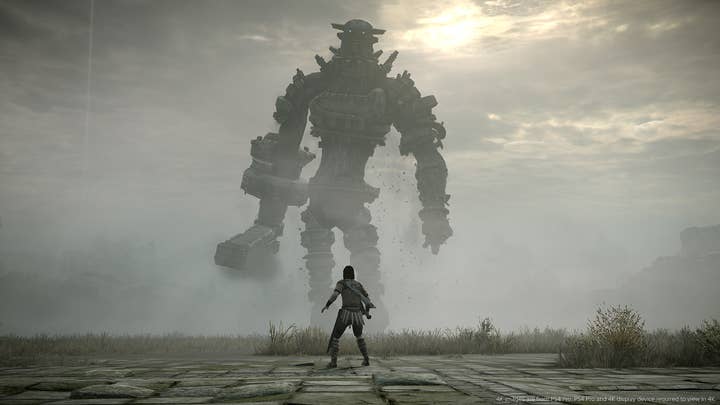Learning to love older games
The recent boom in remastered games isn't just business as usual; it signifies an underlying shift in how consumers value older games
Retro games have been a part of videogames for several decades. Really, for as long as there have been games old enough for people to have grown nostalgic about them, there has been a devoted audience for their retro charms. The past few years, however, have seen a quiet revolution in this area.
The 13-year-old Shadow of the Colossus topping the UK charts this week is only the latest in a litany of events which point to a major change in both the cultural and commercial significance of older games; from the dramatic sales performance of the remastered Crash Bandicoot titles last year, to the born-again cult hit status of Rez Infinite, to the wailing and gnashing of teeth that greeted stock shortages of Nintendo's NES and SNES Classic microconsoles, we're seeing a boom that suggests not just fleeting nostalgia, but a radical change in how consumers perceive and value older games.
"Tossing out a SNES ROM on an iOS emulator was a very easy way to make money from otherwise moribund old games"
This is not the first retro boom, of course. SNES-era titles have been re-released on all sorts of platforms since their heyday, although one could reasonably question just how much of a long tail this actually represented commercially; tossing out a SNES ROM on an iOS emulator was a very easy way to make money from otherwise moribund old games, but never seemed to be a business that made anyone wealthy.
The real success of those games, in a sense, came through their recognition as cultural touchstones of an era; it wouldn't be surprising to find that 8- and 16-bit titles performed better in terms of T-shirt sales than re-release sales, when all the numbers were totted up. The last generation of consoles, too, saw a kind of mini-retro-boom, as publishers filled out release schedules with (often rather hastily developed) remasters of PS2 games - including this week's hit, Shadow of the Colossus.
Several factors mark the current resurgence in retro titles as being very different from previous booms. First and foremost, there's the fact that older games are now standing shoulder to shoulder with new titles and holding their own commercially. The notion of quickly dropping out a remaster of a popular old title in order to fill a gap in a release schedule and hoover up some extra revenue pales in comparison to the serious effort being put into the current series of remasters, and the serious rewards they are reaping in return.

Yet beyond the boost in both the quality of remasters and their commercial reception, there are cultural factors that are even more suggestive that this is a fundamental shift in consumer perceptions, not just a sudden flash of nostalgia playing itself out. It's telling, I think, that after decades of trying and failing to make videogame-related TV shows work in the UK, the formats that have finally turned out well for production companies are those that eschew contemporary games in favour of older titles. It's also no coincidence that the boom in commercial success for games more than a decade old comes at the same time as the underappreciated phenomenon of games like Grand Theft Auto V, whose sales success has kept it in the charts for literally years on end.
"All of this marks a dramatic shift for an industry that has been utterly obsessed with the newest, latest thing, to the exclusion of all else"
All of this marks a very dramatic shift for an industry that has, for much of its history, been utterly obsessed with the newest, latest thing, to the exclusion of all else. It's not so long ago that the sales of videogames were so front loaded that nothing after the first weekend really mattered, and it was exceptionally rare for games to get subsequent production runs after their first printing.
Of course, this aspect of the industry has been changed as a consequence of digital distribution, which means older games don't disappear from circulation entirely (as they used to when retailers ditched them from the shelves in favour of newer titles); it's interesting to consider whether this change is part of the background to consumers' changing attitudes to older games, which were previously being signalled to be worthless by the industry's own behaviour towards its back catalogue titles.
There's a powerful demographic factor in play here, too. Previous retro booms were primarily focused on 8- and 16-bit titles; the present revival, however, harkens back largely to the PS2 era (and to a lesser extent the PS1; lesser if only because of the greater creative challenges of remastering those games for modern hardware). The PS2 era, of course, was an almost unprecedented boom era for videogames as a whole, witnessing massive, rapid demographic expansion of the audience along with huge commercial success for a wide range of titles and creators. It makes intuitive sense that the retro boom that came about when that audience got old enough to remember games of the era nostalgically would itself be a major commercial event - the louder the noise, the louder its echo.
"For decades, most games have been created with the assumption that they got only one bite at the cherry"
The question the industry needs to ask itself at this point is what this kind of changing climate around the perceived value of older games or their remasters means for the business models of games overall. For decades, most games have been created with the assumption that they got only one bite at the cherry; long tail sales or later revivals have never been considered realistic, but must now be seen not just as a possibility, but as a very real part of how the industry has evolved and changed.
The positives are obvious; games are finally getting to have the kind of cultural longevity that other media have enjoyed since their inception. The questions, however, are complex. Does this mean the industry will develop a whole sub-sector devoted to keeping classic games updated for the latest hardware, or at least to bringing them up to date and re-releasing them every decade or so? Or is one of the driving forces of this movement the fact that current hardware has reached a point where games once bound by the limitations of their platforms can now be released in versions "good enough" to last for ages?
Moreover, of course, there's going to be a whole cottage industry in figuring out which games will work for this treatment, and which will fail to reengage their audiences; it's not as simple as looking at sales figures, and clever ways of making the intangible (how well loved a game remains) into actionable data will be immensely valuable.
Most of all, though, this is an exciting trend simply because of what it means for videogames as cultural artefacts. The long-standing and often mocked dialogue about what game would be this medium's Citizen Kane, in some ways, flew wide of the mark in its most fundamental premise; the medium never lacked for games that established or challenged underlying rules of interaction, narrative or player agency. What videogames lacked most of all, rather, was a Blade Runner or a Star Wars; games that people would recall from their childhood or youth not just as a point of nostalgia, but as something they actively desired to engage with again. People don't say "hey, do you remember Blade Runner?", they just pull out the latest remastered Blu-Ray edition and actually sit down and watch it; it is a piece of culture independent of its era, whereas games have often been relegated to mere window dressing for nostalgia for an era as a whole.
This, finally, may be behind us; Shadow of the Colossus isn't being bought by people nostalgic for the 1990s (that's what Steps releasing a new album is for), but by people who want to experience it again as a fantastic game. That's a far more meaningful moment of progress for the medium than many may realise.








